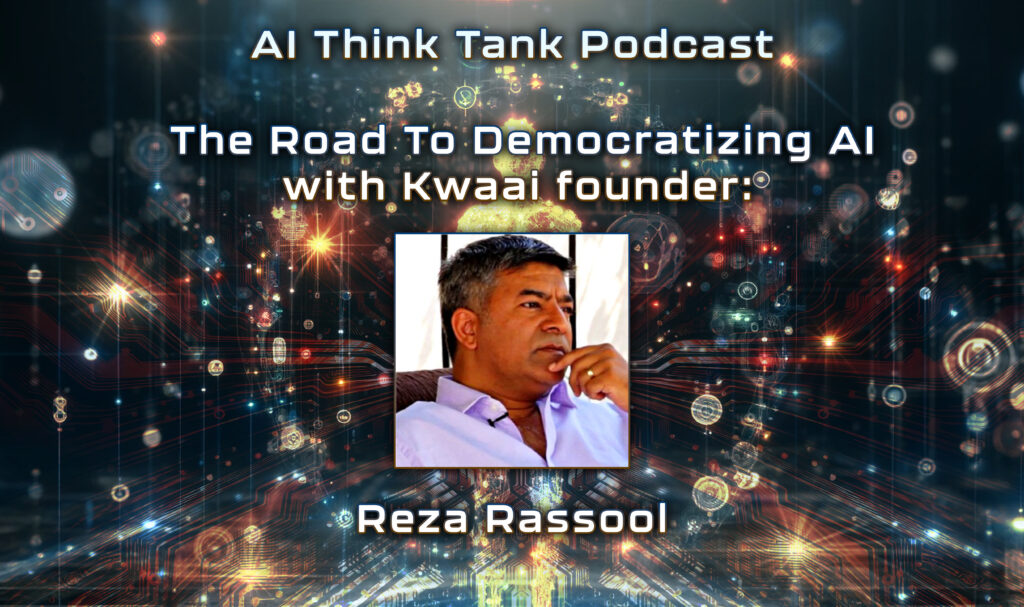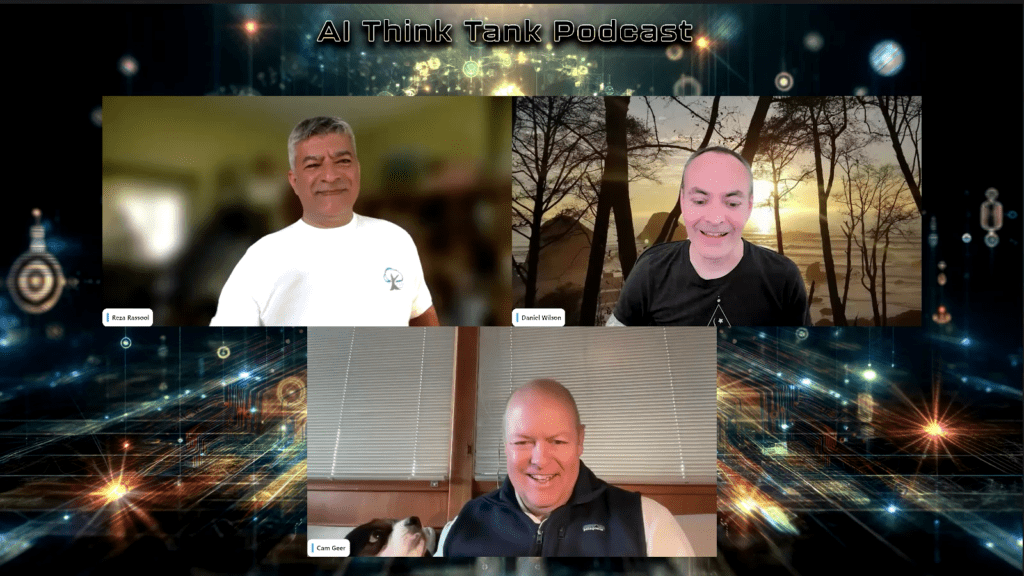Discussion with Reza Rassool and Cam Geer

For our 5th episode of the AI Think Tank Podcast, I had the pleasure of joining two key figures in the field of data democratization and its intersection with AI: Reza Rassool, founder of Kwaai, and Cam Geer, Co-Founder and COO of Cryptid Technologies. Throughout our conversation, we discussed Kwaai’s bold efforts to make AI accessible and beneficial for everyone, unpacking the complexities and transformative potential of their initiatives.
Reza shared compelling insights from his rich background, particularly his transition from media streaming innovation at Real Networks to retiring to spearhead the creation of Kwaai. He passionately outlined Kwaai’s mission, which centers on crafting a personal AI operating system designed to empower individuals rather than serve corporate interests. This system emphasizes personalization, security, and independence from dominant cloud services to safeguard user privacy. Reza expressed this vision poignantly, stating:
“Our goal is to redefine the interaction between technology and personal data. We envision an AI that is not just a tool used by the masses but an extension of the individual, respecting their privacy and enhancing their autonomy.”
Where things are heading
We explored the multifaceted approach Kwaai takes towards AI development, which includes software development, fundamental AI research, and the formulation of ethical policies. Reza elaborated on the necessity of this diverse approach to ensure that AI development aligns with human-centric values and operates transparently and ethically. This is an Open Source effort with the practical needs of many different types of individuals in mind.
Cam Geer added a vital dimension to our discussion, emphasizing the critical role of data provenance in the integrity and utility of AI systems. His company, Cryptid Technologies, focuses on securing the lineage of data utilized in AI, ensuring its origin and manipulations are transparent and verifiable. This aspect is increasingly crucial as AI permeates more personal and creative domains. Cam succinctly captured the essence of his work with a notable quote:
“At Cryptid, we strive to create an environment where data does not just exist but tells a story of its authenticity. By securing data provenance, we ensure that the foundations of AI are built on trust and transparency, which are essential for its ethical application.”

The potential societal impacts of democratized AI dominated much of our conversation. Both Reza and Cam shared a vision of the future where AI acts as a personal assistant that enhances individual productivity and decision-making without infringing on privacy or autonomy. They discussed the broader implications for industry standards and regulatory frameworks, advocating for a community-driven approach to AI development. This, they argued, would ensure the technology is shaped by diverse contributions, reflecting a wide array of needs and perspectives.
The Open Source and Supporters
Throughout our talk, the commitment of our guests to an open-source collaboration in AI development was evident. They believe that such collaborative efforts are crucial for fostering innovation in AI technology and ensuring that it benefits the whole of society, not just a select few. As we delved into these discussions, the complexity of democratizing AI became apparent—balancing technological advancement with ethical considerations is a formidable challenge, yet one that holds immense potential for societal benefit.
Along with these efforts, Kwaai has garnered the support and sponsorship from companies and groups such as: ArkusNexus, Chase, Salesforce, Wiley, College of the Canyons, Social Linux Expo, DataConLA, Ai4, and the AI Think Tank Podcast. Our members also include great minds such as Doc Searls, Bruce Schneier, and Larry Namer. With no shortage of talent or variety of perspectives, Kwaai is making progress with its initiatives and goals on a daily basis.
In closing, our conversation not only highlighted the pioneering work of Kwaai and Cryptid Technologies but also underscored the transformative power of AI when guided by principles of openness, security, and personal empowerment. For those inspired by our discussion or interested in participating in this transformative endeavor, I encourage engaging with Kwaai’s projects and community forums.
The road to democratizing AI is fraught with challenges but also rich with opportunities for significant societal impact. It requires a multidisciplinary approach, combining technical prowess with ethical foresight and regulatory wisdom, to ensure that AI technologies developed are truly beneficial for all sectors of society. As Reza poignantly noted:
“AI can either be a tool that enhances our lives or a tool that enhances control over our lives. The choice lies in how we develop, deploy, and govern these technologies.”
Our dialogue serves as a reminder of the power of collective effort in shaping the future of technology, a future where AI serves humanity universally and justly. As we continue these critical conversations, the path to a more equitable tech landscape becomes increasingly clear, marked by collaboration, innovation, and a steadfast commitment to the public good.
Subscribe to the AI Think Tank Podcast on YouTube.
Would you like to join the show as a live attendee and interact with guests? Contact Us

